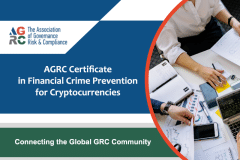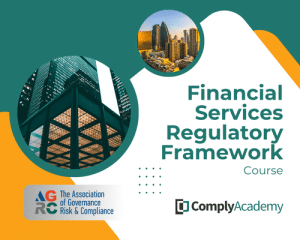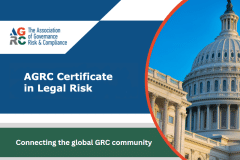The AGRC Certificate in Risk Management (Level 3) equips professionals with the tools and knowledge to identify, assess, and mitigate risks within the financial services industry and beyond. This certification is designed for individuals seeking to strengthen their risk management expertise and apply practical frameworks to real-world scenarios.
Key Benefits:
- Gain 1-year free membership at the Association of Governance, Risk & Compliance (AGRC).
- Earn an accredited certificate recognized by The London Institute of Banking & Finance (LIBF).
- Develop advanced skills in risk management using internationally recognized frameworks.
The course focuses on:
- Understanding risk principles and their application within financial services.
- Implementing risk management frameworks, including ISO 31000 and COSO ERM.
- Addressing regulatory challenges and managing compliance risks effectively.
- Building resilient organizations through strategic risk management practices.
What You’ll Learn:
- Principles of risk and their impact on financial institutions.
- The Three Lines of Defence model and its application in risk management.
- Regulatory compliance requirements, including Basel III and Solvency II.
- Techniques for conducting risk assessments and monitoring.
- Strategies for risk treatment, incident response, and organizational resilience.
Learning Outcomes:
By the end of the course, participants will:
- Understand risk management principles and frameworks.
- Apply risk assessment techniques to identify and evaluate risks.
- Develop risk treatment strategies to mitigate and manage risks effectively.
- Integrate risk management practices into organizational processes.
- Enhance organizational resilience through robust risk policies and controls.
Target Audience:
This course is ideal for:
- Risk managers and officers within financial services.
- Compliance professionals seeking to enhance their risk management skills.
- Professionals responsible for implementing risk management frameworks.
No prior knowledge is required, though participants should have a strong educational background and proficiency in English.
Format:
- Self-paced online interactive learning with 15-20 hours of study time.
- Includes analysis of practical risk management case studies.
- Flexible registration: Start anytime and study at your own pace.
- Assessment via online multiple-choice exams.
What’s Included:
- 1-year free AGRC membership.
- Online exam and AGRC Certificate upon completion.
- Access to all course materials, practical case studies, and online support.
Completion Requirements:
- Pass unit tests (33 multiple-choice questions) with a 70% pass mark.
- Pass the final exam (40 multiple-choice questions) with a 70% pass mark (two attempts allowed).
- Unit tests are 10 minutes each, and the final exam is 60 minutes.
Accreditation and CPD Recognition:
The syllabus is verified by external subject matter experts and accredited by financial training bodies, such as CISI and ACAMS, for 10 CPD units.
Registration and Access:
To register, click on the Get this course button to pay online. Alternatively, contact us at info@comply.academy to request an invoice.





